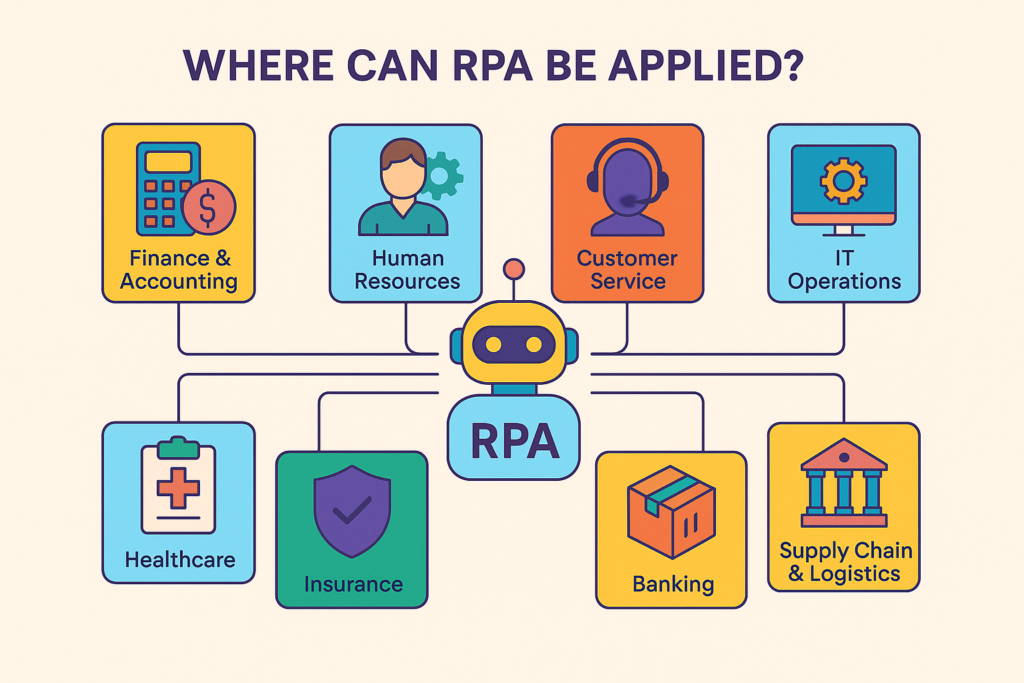Where Can RPA Be Applied?
Robotic Process Automation (RPA) has become a game-changer for organizations across different sectors. Its adaptability makes it useful in virtually any environment where routine, digital tasks are part of everyday operations. If a process is rules-driven, repetitive, and involves handling data across systems, RPA can step in and take over—boosting efficiency while reducing manual errors. Robotic Process Automation (RPA) can be applied across a wide range of industries and departments, streamlining tasks that are repetitive, rule-based, and time-consuming.

Let’s explore how RPA can make a meaningful difference across various departments and industries.
1. Finance and Accounting :
Financial operations involve handling large amounts of data and transactions every day. RPA helps streamline these processes by taking over routine tasks such as:
- Entering and validating invoices.
- Matching purchase orders with payments.
- Updating financial records.
- Generating periodic financial reports.
- Reconciling accounts.
- Value Delivered: Quicker processing times, improved data accuracy, and better control over compliance and reporting.
2. Healthcare and Medical Services :
In healthcare, accuracy and timely access to data are essential. RPA can manage repetitive administrative work, allowing healthcare staff to concentrate on patient care. RPA supports functions like:
- Registering new patients.
- Scheduling appointments.
- Processing insurance claims.
- Updating electronic health records.
- Managing billing cycles.
- Value Delivered: Reduced administrative burden, faster service delivery, and fewer documentation errors.
3. Retail and E-Commerce :
Retailers handle everything from inventory to customer support across multiple channels. RPA simplifies operations by automating:
- Inventory updates and restocking alerts.
- Order processing and tracking.
- Managing returns and refunds.
- Updating product listings.
- Monitoring pricing across competitors.
- Value Delivered: Enhanced order accuracy, real-time inventory visibility, and better customer experience.
4. Banking and Financial Services :
Banks rely heavily on process consistency and compliance. RPA plays a key role in reducing human effort in processes such as:
- Opening new customer accounts.
- Verifying identity documents.
- Monitoring transactions for suspicious activity.
- Automating loan approvals.
- Preparing reports for auditors.
- Value Delivered: Faster customer service, fewer compliance issues, and stronger fraud prevention.
5. Manufacturing and Supply Chain :
Manufacturers deal with complex logistics and data coordination. RPA helps manage:
- Inventory tracking.
- Creating shipping labels and documentation.
- Monitoring supply levels and reorder points.
- Updating production schedules.
- Automating procurement and invoice matching.
- Value Delivered: Lower operational delays, smoother supply chain flow, and improved inventory control.
6. Human Resources (HR) :
HR teams are often bogged down with paperwork and routine employee-related tasks. RPA brings relief by handling:
- Employee onboarding and document processing.
- Leave and attendance tracking.
- Payroll data entry and verification.
- Generating employment letters and reports.
- Screening job applications.
- Value Delivered: Streamlined processes, more consistent HR data, and better employee engagement.
7. Information Technology (IT) :
In IT operations, RPA can reduce the manual effort involved in repetitive system tasks. RPA can be used for:
- Resetting user passwords.
- Monitoring system performance.
- Assigning and updating helpdesk tickets.
- Running backups.
- Deploying software updates.
- Value Delivered: Faster issue resolution, lower workload on support teams, and more stable systems.
8. Government and Public Services :
Government offices often handle large volumes of documents and applications from citizens. RPA helps speed up:
- Processing permit or license applications.
- Managing social benefit enrollments.
- Verifying identity documents.
- Responding to public queries.
- Organizing digital records.
- Value Delivered: Faster service delivery to citizens, better record management, and improved transparency.
A Universal Solution for Repetitive Work
What makes RPA so powerful is its flexibility. It can work with existing applications, mimic user actions, and perform tasks just like a human—only faster and without fatigue. Whether you’re managing a small team or a global operation, RPA can be tailored to your business needs and scaled to handle growing workloads.
Looking to Automate? Let’s Help You Find the Right Process
Not sure where to begin? Our RPA specialists can review your existing workflows and identify which areas will benefit most from RPA. From strategy to implementation, we’re here to guide you every step of the way.
📞 Get in touch today to start your RPA journey.
No sales talk. Just clarity on the right solution.







